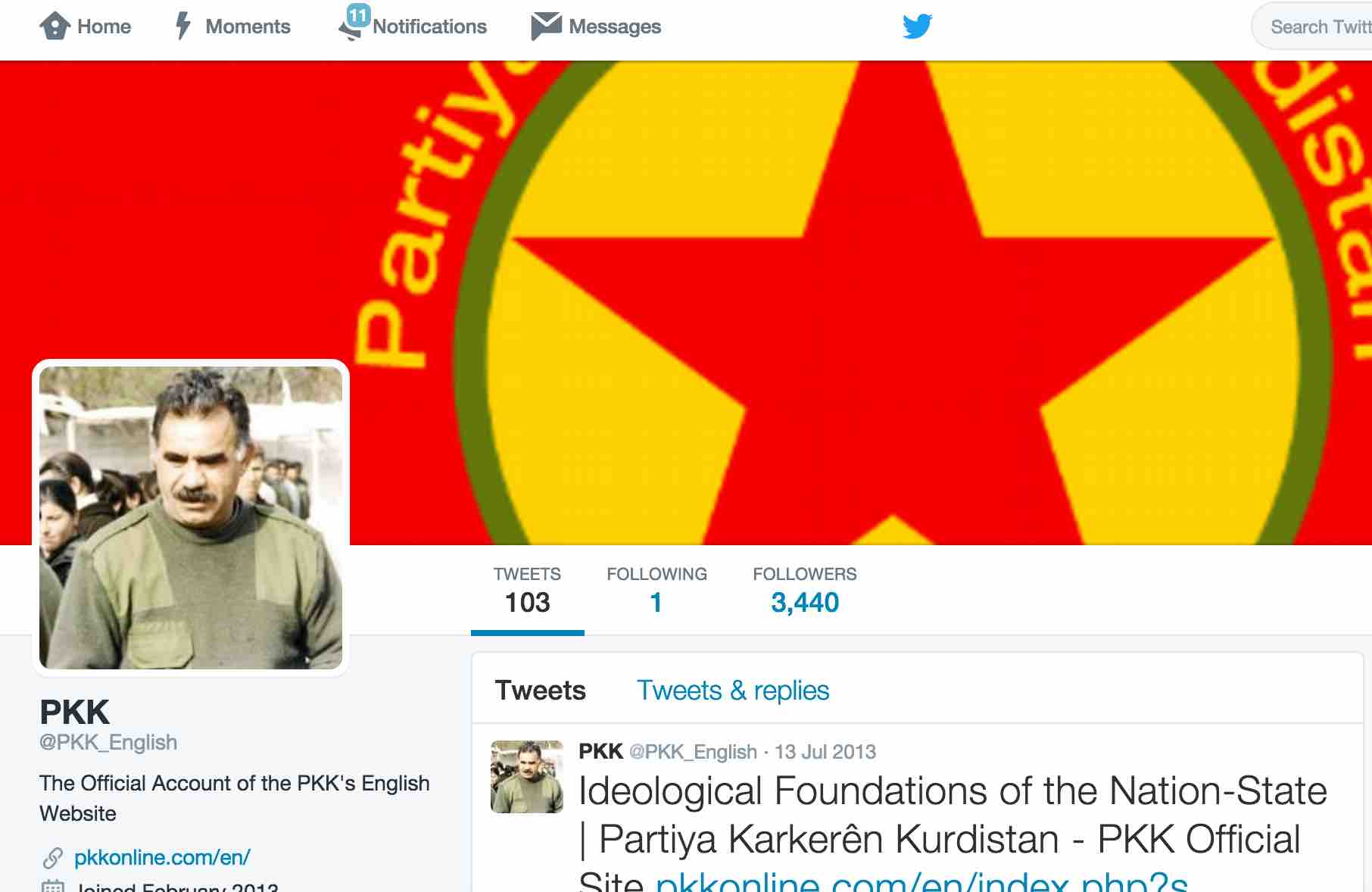Tweeting Terrorists, Part III: How Would Twitter Defend Itself Against a Material Support Prosecution?
In Part I of this series, we listed the many designated foreign terrorist organizations (DFTOs) that seem to have overt Twitter accounts.

In Part I of this series, we listed the many designated foreign terrorist organizations (DFTOs) that seem to have overt Twitter accounts. In Part II, we looked at the material support law as interpreted by the Supreme Court and concluded that the company—at least in theory—may have a real problem under the statute. In this post, we examine some of the defenses Twitter might deploy against a material support prosecution over its hosting of official terrorist group accounts.
For starters, Twitter might try to argue that it is not, in fact, providing a service within the meaning of the statute. This argument seems weak. The reason is quite simply that Twitter openly acknowledges providing “services” in a formal legal document called, significantly, “Terms of Service.”
To argue, as the ACLU’s Gabe Rottman suggested in a blog post, that Twitter’s services don’t count for purposes of the statute because they don’t involve “coordination” between the company and the DFTO seems just wrong. After all, in order to receive “services” from Twitter, the terrorist group has to sign up. It has to give information. It has to agree, under the document, that “Your access to and use of the Services are conditioned on your acceptance of and compliance with these Terms. By accessing or using the Services you agree to be bound by these Terms.” In other words, to get services from Twitter, the group has to agree to a binding contract, to which Twitter also agrees and as part of which “Twitter gives [the group] a personal, worldwide, royalty-free, non-assignable and non-exclusive license to use the software that is provided to [it] by Twitter as part of the Services.” This is hardly the kind of independent advocacy the Supreme Court was referring to in Humanitarian Law Project v. Holder as exempt from the statute. This is, rather, a business contract between two legally accountable actors—one of which is entering into an agreement to provide service to the other.
Second—and in our judgment more substantially—Twitter could argue that though providing services to DFTOs, it is not doing so “knowingly” given the genuine uncertainty about whether the accounts are what they represent themselves to be. Amplifying this argument is the provision of Twitter’s Term of Service that specifically requires that “You may use the Services only if you . . . are not a person barred from receiving services under the laws of the United States or other applicable jurisdiction. If you are accepting these Terms and using the Services on behalf of a company, organization, government, or other legal entity, you represent and warrant that you are authorized to do so.”
Twitter might plausibly argue that it cannot know if the Hamas account really is run by Hamas or is, in fact, precisely the sort of independent advocacy the statute exempts. And it might plausibly argue further, based on the quoted language, that the mere fact that the Hamas account is being used under its Terms of Service constitutes a representation that the user is entitled to receive services from Twitter—and thus cannot actually be Hamas.
Twitter has capabilities beyond ours to assess the authenticity of accounts; the company describes its account verification processes here, for example. That said, genuine uncertainty as to the identity of the service recipient would be a totally legitimate and complete defense against a material support charge. The material support law, after all, does not forbid providing service to entities one believes might be or probably are DFTOs. It forbids providing support to entities one knows to be DFTOs. So if the government were to bring a case against Twitter, it would have to be prepared to prove, beyond a reasonable doubt, that Twitter had the requisite knowledge.
In practice, we suspect this would not be difficult. It is inconceivable to us, after all, that the Justice Department would contemplate actually bringing a criminal action without first informing the company that Twitter was—perhaps unintentionally up until that point—providing service to a DFTO. This notice would surely satisfy the “knowingly” prong of any subsequent litigation. Moreover, Twitter already has processes to identify suspicious accounts, leading to the removal not only of the 125,000 ISIS-related accounts mentioned earlier, but also accounts for Ansar al Shariah Libya (whose creation was reported by the Long War Journal before the account was closed) and Boko Haram. To imagine a criminal case in the real world, in other words, you have to imagine some form of notice being provided the company, either by the government or through its own internal processes, and its persisting in providing service even after discovery and verification. We doubt this particular defense would have legs—either as a matter of law or as a matter of fact before any jury—after such factual development.
Twitter’s best argument, as we suggested previously, would simply be that notwithstanding Humanitarian Law Project, the material support statute is unconstitutional as applied to its provision of service to a DFTO. Back in 2006, when Ben was still at the Washington Post editorial page, the page published an oped by Ismail Haniyeh, a Hamas official in Gaza who was also at the time the Prime Minister of the Palestinian Authority. Ben was not involved in the decision to publish that piece, but he also didn’t dissent from it on any grounds, certainly not under some theory that the publication violated the material support statute. Indeed, we would both argue that such publication is unambiguously First Amendment protected. Twitter might plausibly argue that it is no different from the Washington Post, and hosting a Twitter account and its contents is no different from publishing an oped.
Whether this is right is a question that Humanitarian Law Project does not answer. And, as we noted in the previous post, the Chief Justice held out the possibility that “future applications of the material-support statute to speech [might not] survive First Amendment scrutiny.”
That said, the analogies between Twitter and the Post and between a Twitter feed and an oped is at least a little bit mischievous. When the Washington Post publishes an oped, it is exercising its own editorial judgment that the argument is worth airing. It edits the piece. It is unambiguously the publisher of that document. And it takes responsibility for the possible legal consequences of publication—libel, for example. Moreover, it does not sign a contract with the author in which it undertakes to provide “services” to the author. The Post may enable Haniyeh to speak, but its publication of his oped is not a service to Haniyeh; that is the Post speaking itself.
Conversely, Twitter is not obviously speaking or publishing when it provides a third party access to its system. It doesn’t exercise any editorial judgment over what appears on its system—save the authority retroactively to suspend accounts that violate its rules. Rather, it provides a service by which individuals—or organizations —can publish themselves. Twitter’s Terms of Service are once again illustrative here. The first words of the “Basic Terms” section read: “You are responsible for your use of the Services, for any Content you post to the Services, and for any consequences thereof.” The document later reads: “All Content, whether publicly posted or privately transmitted, is the sole responsibility of the person who originated such Content. We may not monitor or control the Content posted via the Services and, we cannot take responsibility for such Content.”
Indeed, in the civil context, Congress has affirmatively forbidden courts and state legislatures to treat entities like Twitter as a publisher or a speaker for purposes of liability. It would be at least a little odd to treat Twitter as a publisher and speaker for First Amendment purposes yet also prohibit treating it as a publisher or speaker for liability purposes. Indeed, it’s reasonable here to ask in what sense Twitter institutionally, having disclaimed responsibility for third party submissions, is speaking at all. A court might reasonably see Twitter as more akin to a manufacturer of megaphones which distributes them to all comers for use in the public square. And a court might conclude that Congress has said that such a manufacturer does not have a First Amendment right to give megaphones to the PKK any more than it has the right to train the PKK in international law.
Ultimately, it’s not clear how a court—or how the Court—would apply Humanitarian Law Project to Twitter. It is worth noting, however, that the Humanitarian Law Project Court made clear that it wasn’t interested in making its own judgments about what does or does not support terrorists and would instead defer to Congress and the Executive (who were notably both in agreement about the threat posed): “[W]hen it comes to collecting evidence and drawing factual inferences in this area, ‘the lack of competence on the part of the courts is marked,’ and respect for the Government’s conclusions is appropriate.”
While it seems fair to say the Court agreed with the other branches’ assessments in that case, the point was that “Congress and the Executive are uniquely positioned to make principled distinctions between activities that will further terrorist conduct and undermine United States foreign policy, and those that will not.” In other words, in 2010 at least, Roberts had six votes for the view that if the conduct was covered by the statute, even if the conduct was speech, then the Court wasn’t going to do too much second-guessing about whether or not that that coverage was wise.
The outcome of a hypothetical case against Twitter may ultimately depend on its specific facts. Twitter generally may be more sympathetic than an organization that wants to train the PKK; but the justices’ sympathy might disappear if the company had refused to remove overt terrorist accounts after reasonable notification, or if the case were brought in the wake of a terrorist attack by a group to which Twitter continued to provide service. Moreover, depending on changes in the Court’s composition, a matter recent events puts very much in question, the Humanitarian Law Project Court’s commitment to deference could yield in favor of strong First Amendment protections. (Two of the six justices who signed that opinion—Justices Stevens and Scalia—are no longer on the Court.)
In the end, what seems to be protecting Twitter in this area is less the law—which seems to give the government a powerful lever to lean on Twitter for more aggressive action—than a set of prudential judgments on the part of the FBI and Justice Department. These judgments may include the concern to stay far away from the First Amendment line in prosecuting material support cases. They may also include the sense—surely correct—that institutional DFTO overt use of Twitter for communications is a far lesser problem than Twitter’s abuse by less overt actors affiliated with those same groups for recruiting and organizing purposes. Sparking a major confrontation with Twitter over its overt institutional use by DFTOs may actually impair cooperation on matters like, say, those 125,000 accounts that have been suspended over the past several months.
The tolerance may even reflect a judgment on the part of the Justice Department that going after the pure speech of terrorist groups is just not a good idea. After all, quite apart from what the law may allow on the subject, would we really be better off not being able to follow what terrorist groups are thinking and trying to communicate to their followers?



.jpeg?sfvrsn=96471529_5)

.jpg?sfvrsn=d45482bc_5)
